#Brazilian slavery
Explore tagged Tumblr posts
Text
Black History Month Fact #5
Brazil was the last country in the Americas to abolish slavery in 1888. Princess Isabel signed the Golden Law, granting freedom to all enslaved individuals.
That means that when my mom was a kid in the early 1960s, there were still people alive who had once been slaves.

#random fact#random facts#did you know#little known fact#random factoid#random factoids#history facts#country facts#brazil#brazilian history#slavery#south american history#black history month#black history#yes really#sad but true#recent history#modern history
10 notes
·
View notes
Text
Ainda estou surpreso que tem pessoas chocadas que o José de Alencar era um racistinha pró escravidão. Tipo óbvio. Tu já leu um livro dele? Eu já (infelizment). Impossível ver como ele tratava de indígenas nos livros deles e a super luz positiva nos latifundiários e achar qualquer outra coisa.
P.S: Ele também era extremamente machista nos livros e honestamente eu pessoalmente acho ele um escritor péssimo, os livros dele não me prendem de forma alguma, mas mais que isso são dolorosos de ler - principalmente pelo mencionado acima machismo e racismo, mas em menor grau porque a escrita dele é bem macante (e eu digo isso como alguém que normalmente gosta de livros muito verbosos).
PS. 2: Eu sou Alencar hater desde os 12 anos. Nunca fui a criança que odiava as leituras obrigatórias da escola, na real amei todas MENOS o Guarani (Iracema eu só li resumo porque me recusei a passar por Alencar de novo). Na real o Guarani foi o primeiro livro que eu odiei na vida. Genuinamente me forcei a terminar tremendo de raiva e surpresisssimo que era possível não gostar de um livro.
[Translation: I am shocked there are ppl genunally surprised that José de Alencar was a pro slavery racist. Like duh. Have you ever read one of his books, because I (unfortunally) did. It's impossible to see the way he depited indigenous people in his work and the super positive depition of rural landlords and think anything else.
P.S: His books are also very sexist and, I, in particular also find them just bad as books, they are deeply boring and I found them painfull to read - mostly because of the aforementioned sexism and racism, but in a smaller level because his writing is just not good (and i say that as someone that likes purple prose).
P.S 2: I'm an Alencar hater since I was 12. I was never the kid that disliked the school mandatory readings. In fact I loved them EXCEPT O Guarani (I only read a summary of Iracema because I refused to endure Alencar a second time). In fact O Guarani was the first book I hated in my whole life. Genuinally had to force myself to finish it, trembling, in pure anger, while shocked that hating a book was actually possible. ]
#josé de alencar#o guarani#literatura brasileira#brazilian literature#alencar hate club#book club where we hate#brazilian literature but the bad one#promised myself I would do more posts in portuguese#no one else cares about this post#but i actually found ppl surprised over Alencar being pro slavery and I needed to vent#because like he was soo opnely a bigot
2 notes
·
View notes
Text
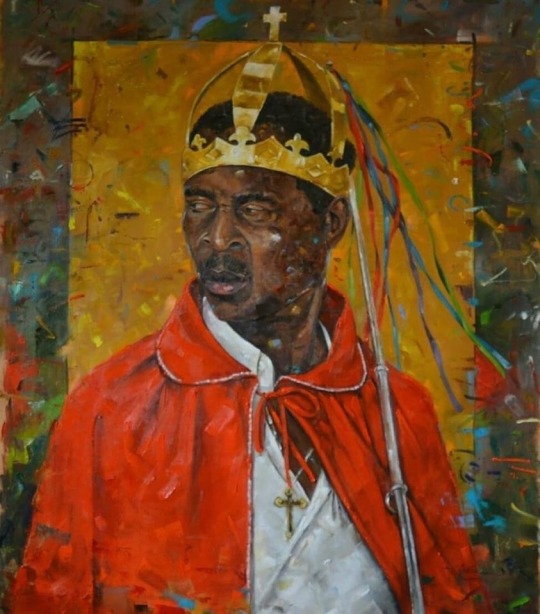
Chico Rei, King of the Congo
Painting by Márcio Cintra from the series Rhythm, Colors and Faith of Congado Mineiro. Representation of Chico Rei, the character who gave rise to the congado festivals in Minas Gerais. Congolese is brought to Brazil as a slave, conquers his manumission, manages to acquire a gold mine and starts to buy captives to free them. In his honor, the freedmen called him king, and the other slaves celebrated him with music and dance in the traditional festivities for Nossa Senhora do Rosário, a saint who is also linked to the origin of the congadas.
#marcio cintra#king#minas gerais#brazilian culture#brazilian artists#congolaise#congo#slavery#gold mines#brazilianart
10 notes
·
View notes
Photo

My DNA-kit results showing me I have South- and North-Carolinan colonist family (where slavery was horrendous) and simultaneously I have Native-American blood. I smell heaviness here... :^)
#I did familytree research and indeed found a lineage of slave driver ancestors :*) so chances are present they have had offspring with a;#Brazilian slave who worked on the fields there (i don't know if Native-American slavery was allowed or common?)#- However... The fact that I live in Europe AND I have Native-American blood somehow kinda comforts me because slave drivery was mostly;#a man's only business and the Native-American must have been (i think...) a woman#so the fact that I do live in mainland Europe means they have brought her to Europe as well (i think)#and that testifies of love (...i think)?? unless it's forced migration...#*or the slave driver ancestor lived in America with their family (also daughters) and his Dutch daughter was impregnated by a Brazilian??#anyways... speculations#personal
4 notes
·
View notes
Text
The Brazilian Government of President Luiz Inácio Lula da Silva Thursday issued an apology to the black population for subjecting their ancestors to slavery, which still has consequences in modern-day society. In his message, Attorney General Jorge Messias underlined the need to combat racial discrimination. “The Federal Government publicly apologizes for the slavery of the black population and its effects. It recognizes that efforts must be made to combat racial discrimination and promote the emancipation of black Brazilians. Finally, it commits to strengthening the focus on the creation of public policies to this end,” Messias said during an event in Brasilia. At the same gathering, Human Rights Minister Macaé Evaristo recalled the struggle of the black population for freedom and equality. In her view, this recognition is the result of this effort coupled with effective action by the black movement. “In this path of struggle, which is abolitionist, that we fought and continue to fight for freedom, we have been building very important steps every day. This memory of more than 300 years of slavery does not end on May 13, because May 14 begins with the total abandonment of the black population in the country,” she recalled.
continue reading
No mention of reparations.
0 notes
Text
[...] Abolitionist clubs and organizations began to emerge in several cities throughout Brazil and gained momentum through the end of the nineteenth century. After independence in 1822, many Brazilian citizens felt ashamed to be the object of European scrutiny. Many did not believe that slavery was fundamentally wrong, but they were concerned about the country’s precarious reputation out of bourgeoning nationalist sentiment. Those against slavery believed that the institution of slavery and slaves themselves were an impediment to Brazil’s modernization. The desire for acceptance by Europe and for modernity were important motives of Brazilian abolitionism. Abolition was turned into an issue of national honor, and as famous abolitionist Joaquim Nabuco made clear, “Abolitionist propaganda . . . was not directed toward the slaves . . . but against an institution.” Thus, the emancipation movement was not about freeing slaves but about freeing the nation from slavery and slaves. The interference of Great Britain and France in the affairs of the new nation incited a good deal of hostility. [...] Brazilian slaveholders were especially incensed by the fact that some European nationals residing in Brazil owned slaves. [José de] Alencar criticized the former slaveholding Europeans for now forcing the Brazilians to abolish slavery. He describes sardonically the hypocritical position of the European philanthropist toward the last two slaveholding nations in the Americas: “The European philanthropist, between the smoke of the fine tobacco of Havana and a fine cup of Brazilian coffee, gets caught up in his humanitarian utopia and hurls at these countries a great many insults for maintaining slave labor. But why don’t these moralists reject with disgust the fruit of African labor?” Alencar and many proslavery supporters saw the Brazilian abolitionist movement as fundamentally fueled by foreign pressure. [...] Supporters of slavery saw abolitionism as an antinationalist movement that threatened to jeopardize the future of the new nation and the security of slaveholders, who saw their slaves as legitimate property. Attributing the greater part of Brazil’s economic growth and stability to slave labor, they maintained that it would be to Brazil’s detriment to emancipate slaves. They further criticized Brazilian abolitionists for cowering to European pressure and regarded them as traitors to the nation. Slavery, they maintained, was a necessary evil, essential to Brazil’s growth as a nation.
Lamonte Aidoo, Slavery Unseen: Sex, Power, and Violence in Brazilian History
0 notes
Text
Chica da Silva
'Exploring the myths of Chica da Silva reveals how she has been understood in Brazilian culture, as well as the complex and subjective experiences of an enslaved woman ...'
- Anna Drury
#article posting#history#brazil#brazilian history#folklore#chica da silva#academia#history of slavery#south america
0 notes
Text
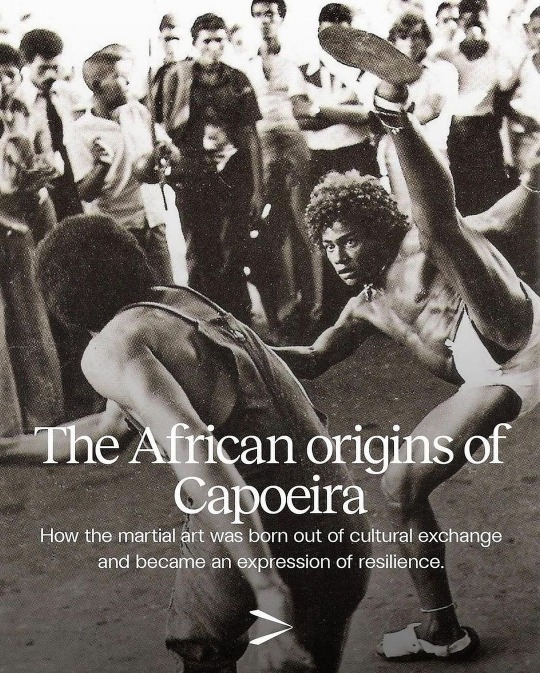
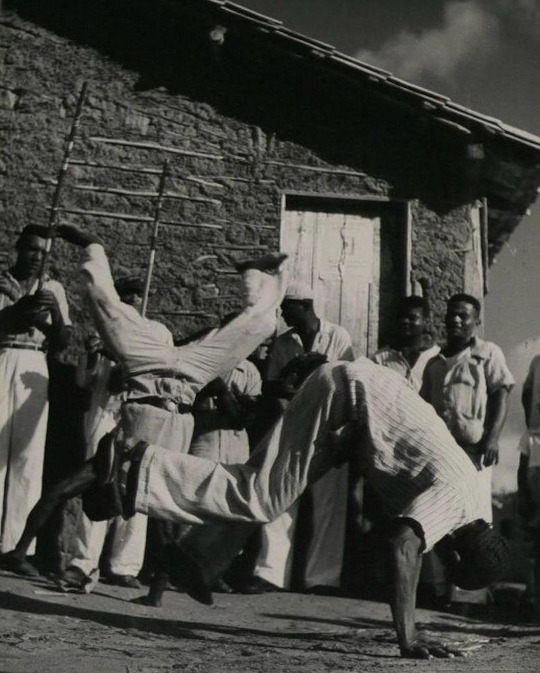
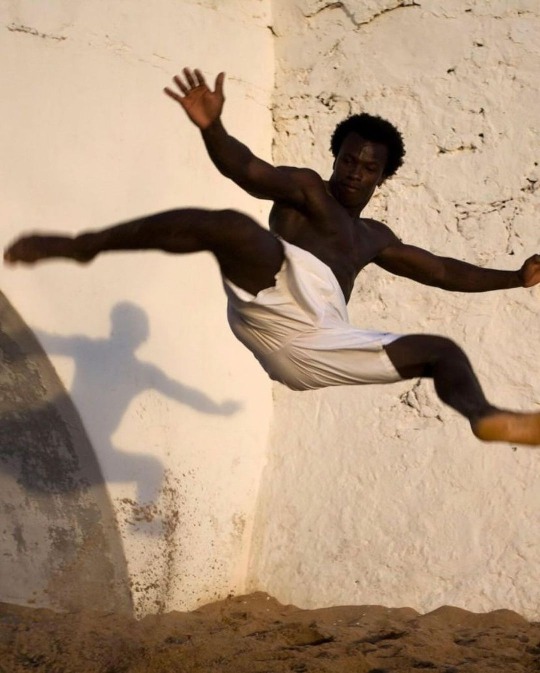
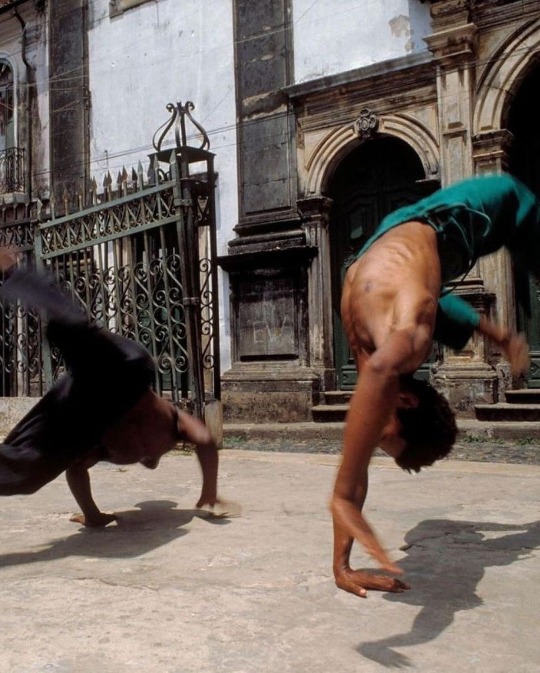

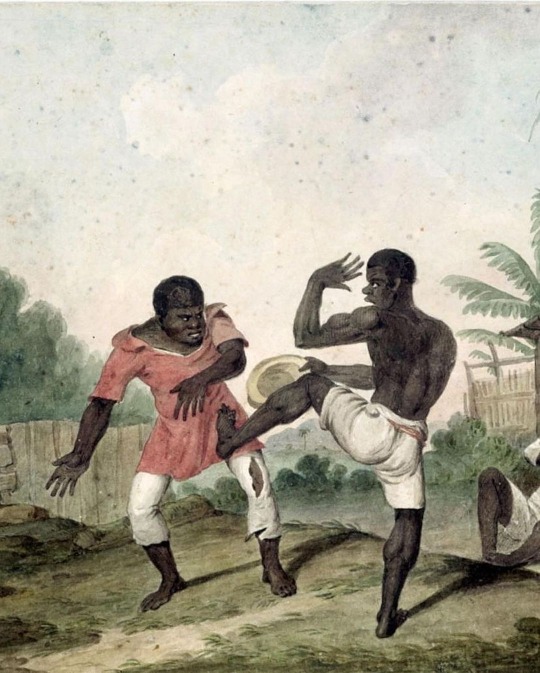
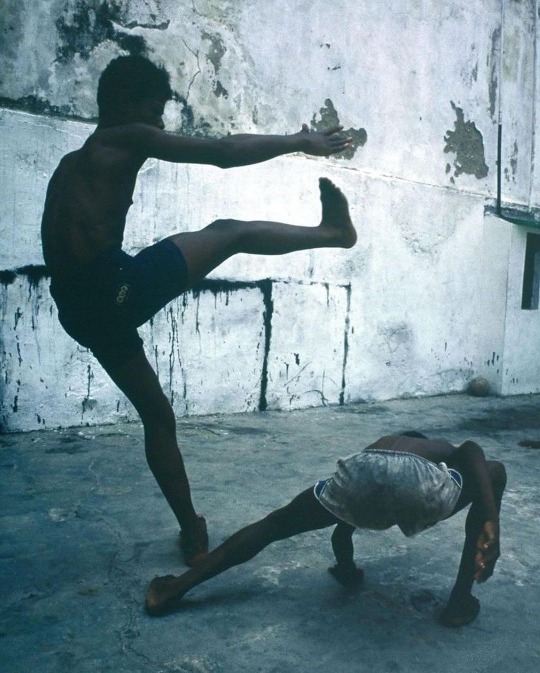
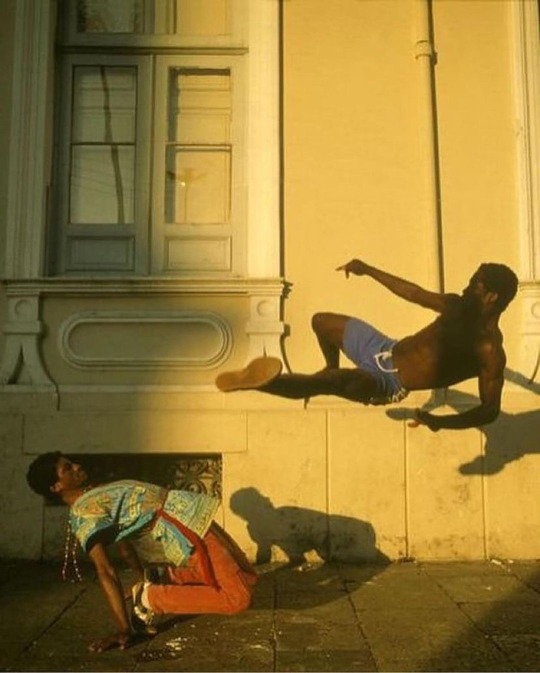
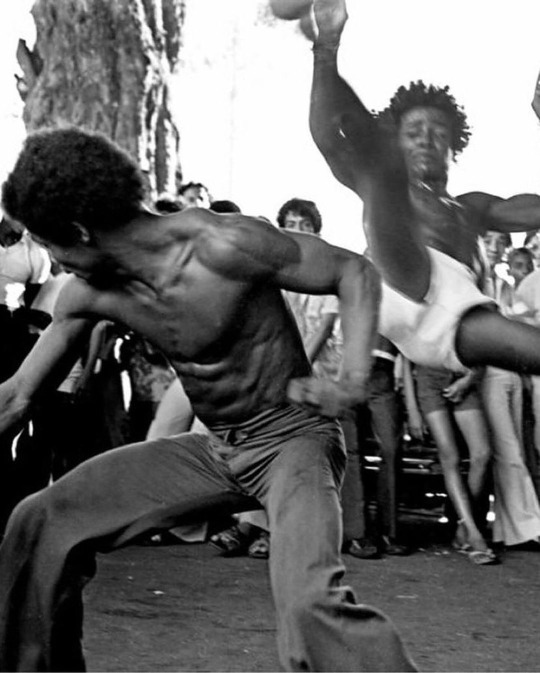
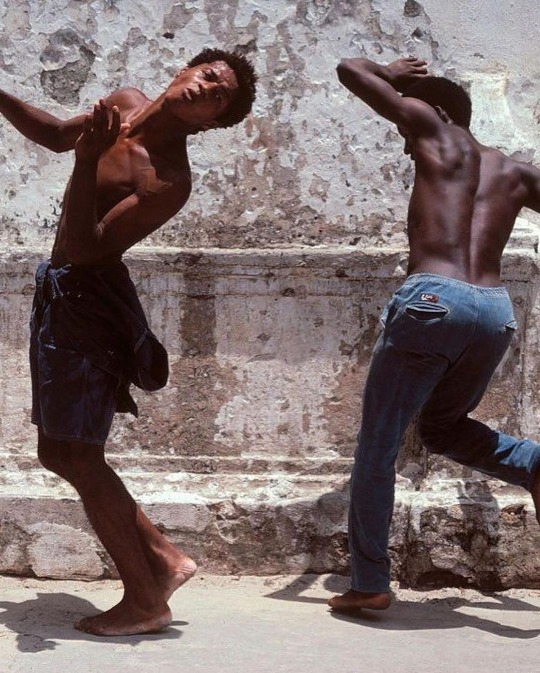
Repost from @moyoafrika
•
#repost• @whatsculture History Class: Tracing the roots of Capoeira. The Afro-Brazilian martial art form incorporates acrobatics, dance, folklore, and music. Two opponents play each other inside a circle (Roda) formed by the other players, who create rhythm for the game by clapping, singing, and playing traditional instruments. It’s the second most popular sport in Brazil and is practiced in different parts of the world today. To understand the significance, we look at how it is a phenomenon born out of migration.
“Capoeira was conceived in Africa and born in Brazil,’’ Mestre Jelon Vieira once said. As a colony of the Portuguese Crown, millions of Africans were shipped and sold in Brazil. There, enslaved Africans shared their cultural traditions, including dances, rituals, and fighting techniques, which eventually evolved into capoeira. Many elements and traditions that would inform capoeira are said to have originated in Angola. At that time, 80% of all enslaved Africans in Rio de Janeiro came from Central West Africa from countries that are now known as Gabon, Angola and both Congos.
People from Angola were prominent among the enslaved Africans who played the game on the streets and squares of Rio de Janeiro, Salvador and other Brazilian port cities at the beginning of the nineteenth century. With many enslaved Africans revolting against slavery, they would soon form communities in villages called quilombos in which they could sustain different expressions of African culture. They used capoeira to defend themselves and resist capture, disguising its martial intent with music, song, and dance.
Capoeira became illegal after the abolition of slavery in 1888. Practitioners were socially ostracised for more 40 years, until the legendary capoeira master, Mestre Bimba, opened the first capoeira school in Bahia in 1932. From there, the martial art would reach all parts of the world. At its core, capoeira is born out of a mix of African and Brazilian indigenous cultures and it represents resistance and resilience 🇧🇷🌍
#moyoafrika #brazil #angola🇦🇴 #africanculture #africanculture #africandiaspora #african
#african#afrakan#kemetic dreams#africans#brownskin#brown skin#afrakans#african culture#afrakan spirituality#capoeira#Brazilian#kids#koda#breakdancing
868 notes
·
View notes
Text

#BlackHistory365 Art Round-Up ⬇️
Elsa Soares via @rodrigoincolors
"This is Elsa Soares. She's one of the biggest names in Brazilian music and considered a matriarch of Brazilian black artistry. BBC named her the voice of the millenium and she was one of the most important and loudest voice against racism, LGBTQIA+ and women rights, among other social causes. She's died yesterday at age 91. This is a very simple, but sincere tribute to her. May you rest in power!
Please, listen to her music and search more about this great woman."

2. Portrait of Sarah Forbes Bonetta by Hannah Uzor via @fyblackwomenart
Portrait of Sarah Forbes Bonetta by Hannah Uzor
Sarah Forbes Bonetta was an Egbado princess of the Yoruba people in West Africa who was orphaned during a war with the nearby Kingdom of Dahomey and later became the slave of King Ghezo of Dahomey. In a remarkable twist of events, she was liberated from slavery by Captain Frederick E. Forbes of the British Royal Navy and became a goddaughter to Queen Victoria. She was married to Captain James Pinson Labulo Davies, a wealthy Lagos philanthropist.
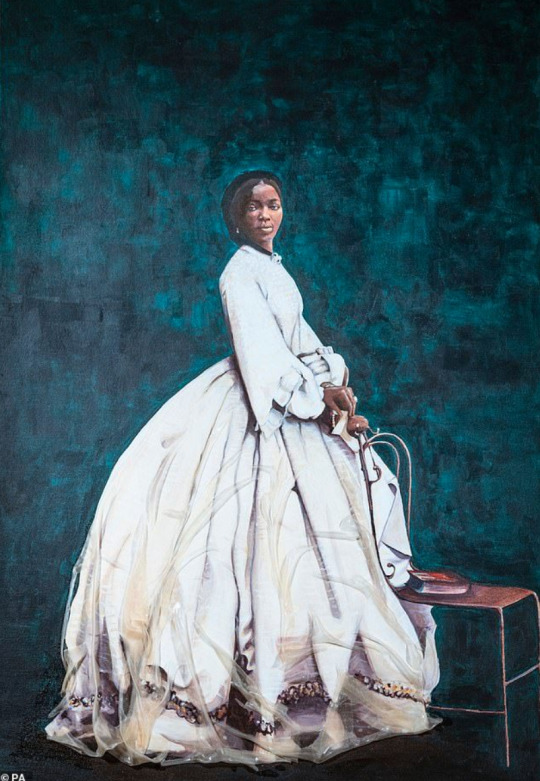
3. Marian Anderson by @novva
I’ve always wanted to do a series on black classical singers for BHM, so here’s a sketch I squeezed in this week—a tribute to the great Marian Anderson!
Marian Anderson (February 27, 1897 – April 8, 1993) was an African-American opera singer and contralto. In 1939, after the Daughters of the American Revolution refused to allow Anderson to sing to an integrated audience in Washington, D.C, then First Lady Eleanor Roosevelt and her husband President Franklin D. Roosevelt arranged for Anderson to perform an open-air concert on the Lincoln Memorial steps on Easter Sunday, April 9, 1939. She was able to deliver a critically acclaimed performance before an integrated crowd of more than 75,000 people, and a radio audience in the millions.
Read more about her accomplishments here, and donate to the National Marian Anderson Museum here.
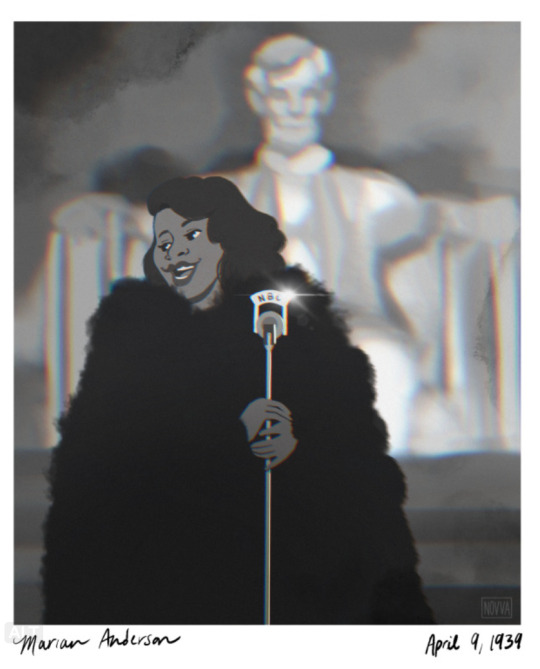
Remember: tag your history & trailblazers art with #BlackExcellence365 for a chance to be featured!
And keep your eyes out for next month's theme... 👀
#blackexcellence365#blackjoyisblackexcellence#blackjoy#blackexcellence#black excellence#black excellence 365#black history month#all black everything#celebrating black history#black history matters#black history#black culture#black lives matter#today in black excellence#black tumblr#blktumblr#black artists on tumblr
2K notes
·
View notes
Note
When Cait married Tony she said they would honeymoon in Italy when it, meaning OL, was over. Good way to get it paid for by OL related appearance next March. Too bad she has to put up with Sam for a couple of hours. Sam, who said many times how he hated S2 costumes and was teased much by Meril, because he didn't like the feminine look. Too much like his true nature. He will certainly bring one of his prostitutes over past 3 years, Ashley being the latest, if her unnecessary week in UK last week for for anything else. 4 trips to Scotland for her in a year. It's clear which business she's really in.
Dear Business She Is Really In Anon,
I think you should be ashamed of yourself, for writing plain libel with no other arguments than your own twisted, bitter and irrelevant world view. If you consider that Ashley Hearn is a prostitute, just because she traveled four times to Scotland since late May 2024, then you are nothing more than a sad, sad troll, who thinks thousands of other women who happen to work in the marketing and sales sectors, all over the world, are also whores, right? You know very well all her trips have been more than thoroughly documented and you also know they did have a tangible impact, as far as that company is concerned. You should also get your fucking timeline straight before you treat us to your word vomit, because even the hatred you gratuitously spread around must have, technically speaking, at least some modicum of plausibility. She did not start to work for SS one year ago, punk: she started to work for them on May 21st 2024, which is exactly six months.

When C married McGill there is no way for you to tell what she said. You weren't there, you are a damn Social Zero and you just rely on word-of-mouth and ridiculously contradictory press releases and interviews. A honeymoon takes a week-end perhaps only in your shanty town and making the ball's organizers 'pay for it' is beyond ridiculous, including as far as C herself might be concerned (what is she, a cheap profiteer?) - supposing that 'relationship' would be anything more than a mutually convenient arrangement of sorts, of course. Sorry, but not the case.
Yeah, too bad she had to put up with S, against all odds, for eleven years, now. This is what really wrecks your pea brain, right? That, and being proven wrong and embarrassingly dumb, over and over again.
For your next endeavor, I suggest you'd turn your attention to your homeland telenovelas (you misspelled Maril Davis' name like a Brazilian and that is a dead giveaway).
Talvez Escrava Isaura seja uma substituição decente e mais acessível? Há reviravoltas baratas (gaslighting, veneno, delírio) o suficiente para mantê-la ocupada por um bom tempo.
youtube
You may wonder why I still answer your tragically ridiculous comments? Well, because it is time for someone to shame you and also show the true, dull and derisory colors of your stupid monomania.
[Later edit]: in no way did I want to imply anything negative about Brazil or its culture. I could have definitely better used one of the bajillion other Globo productions, dealing with Carioca intrigue and/or football wives. If I haven't, it is just because Escrava Isaura was a huge international success even in the Nineties, and remembered as such by many. While I am sensitive to the social and political inacceptable problem of slavery, I maintain that the 1976 adaptation of Guimarães's novel is simplistic and formulaic enough, hence more appropriate for Anon. I am sorry if my poor joke was construed differently and I apologize to all the people who might be offended. If you know me, you'd also know I am probably the last person to disrespect your country and culture.
87 notes
·
View notes
Text
Atrocity created by CAPITALISM
Irish Famine (1845-1852)
Indian Famines during British colonial rule (Various, 18th-20th centuries)
Indigenous Genocide (Ongoing since colonization)
Slavery (16th-19th centuries)
Indonesian Genocide (1965-1966)
Pinochet Dictatorship (1973-1990)
Argentina Dictatorship (1976-1983)
Brazilian Dictatorship (1964-1985)
Pakistan Incident (Bangladesh Genocide, 1971)
The Gilded Age (Late 19th century)
The Great Depression (1929-1939)
Operation Condor (1960s-1980s)
Banana Wars (Early 20th century)
Batista Dictatorship (1952-1959)
Guantanamo Bay (Ongoing since 2002)
Vietnam War (1955-1975)
My Lai Massacre (1968)
Sinchon Massacre (Korean War, 1950-1953)
Kent State Massacre (1970)
Patriot Act (2001)
Red Summer (1919)
Jim Crow (Late 19th-20th centuries)
MK Ultra (1950s-1970s)
1985 MOVE bombing (1985)
1921 Battle of Blair Mountain (1921)
Malayan Emergency (1948-1960)
Mau Mau Rebellion (1952-1960)
Covert war in Yemen (Ongoing)
Stanley Meyer incident (1998)
Genocide in Turkey (Armenian Genocide and others, WWI era)
Congolese Genocide (Late 19th-20th centuries)
Greek Civil War (1946-1949)
Invasion of Cyprus by Turkey (1974)
Washita River Massacre (1868)
Minamata Disaster (1950s-1960s)
Bhopal Disaster (1984)
Kentler Project (1960s-2003)
Thomas Midgley Jr. and leaded gasoline (Early 20th century)
Forced labor in private US prisons (Ongoing)
Collateral murder in Iraq (2010)
Julian Assange and leaks (Ongoing)
US drone strikes (Ongoing)
US sanctions (Ongoing)
US support for dictatorships (Ongoing)
Korean War and civilian casualties (Korean War, 1950-1953)
Nazi funding and collaboration (WWII era)
Hitler and "Judeo-Bolshevism" (WWII era)
#communism#anarchism#marxism leninism#marxism#leftism#socialism#politics#american politics#government#republicans#us politics#conservatives#capitalism#social issues#poverty#anti capitalism#late stage capitalism#eat the rich#leftist#corporate greed#fuck capitalism#kill the rich#eat the fucking rich#fuck billionaires
390 notes
·
View notes
Text

Importance of Black Awareness "Day Awareness Day is not just a commemorative date that remembers Zumbi's fight, but it is a day dedicated to the fight against racism and all the harm it causes to our country. It is a date for us to combat racist practices today, but it is also a time to remember all those in the past who dedicated their lives to combating slavery. Of course, a stance against racism should not only occur on November 20th, but should guide our lives every day of the year. This is because we must always remember that Brazil's current condition is the result of more than 300 years of slavery, which shaped Brazilian customs and practices and made racism and hierarchy inherent marks of our society. Significant changes have taken place in recent decades, but Brazil still has a long way to go on the racial issue."

Source: Google
41 notes
·
View notes
Text
Please vote based on the picture AND the description!


Yasmin [Letters for Absent Friends @larissa-the-scribe]
Adopted into a nice Brazilian family after accidentally walking to a different plane of existence when she was a toddler, she is now trying to figure out being a teenager while she keeps getting weird powers and haunted by an entity that has apparently been hunting her her whole life. She probably would be excited about all the cool stuff she's seeing but also her brother is missing and she is very lost.
Yuro [8 men @starrystories2]
Yuro is a Jade man born into slavery in Karn occupied Lenndabar. At 18, Yuro's knowledge of herbs has recently moved him from slave, to a margianily-treated-like- a-human food taster. He's been tasked to study all maner of poisons and antidotes, and checks all food made at Fort Forza for poison by eating it himself. When he isn't doing this he's learning how to read and write and teaching his friend and bloodbrother Hennen everything he knows.
51 notes
·
View notes
Text
Brazil marks Black Consciousness Day, a new holiday, for first time

Brazilians marked Black Consciousness Day, or the Dia da Consciência Negra, for the first time as a national public holiday Wednesday — formalizing a day long recognized among Brazilians as an occasion to celebrate the Black community and reflect on its long struggle for freedom.
The holiday marks the anniversary of the death of Zumbi, a key figure in Black resistance to slavery in Brazil and a leader of the Palmares quilombo, an independent community of people who escaped from slavery. Portuguese forces captured and killed Zumbi, who was defending the quilombo, on Nov. 20, 1695.
That was exactly 329 years ago.
In 1971, a group of Black student activists in Porto Alegre, Brazil, who called themselves Grupo Palmares, proposed Nov. 20 as the date for Black Consciousness Day. The choice was intentional, according to research by the Geledés Black Women’s Institute’s Black Historians Network and cultural nonprofit Acervo Cultne. May 13, the day slavery was abolished in Brazil, was another option. But because schools and history books tended to exalt Princess Isabel as the Portuguese “redeemer” who signed the abolition law in 1888, the students opted instead for the November date, to center commemorations around Black Brazilians and their legacy.
Oliveira Silveira, one of the four original student members of Grupo Palmares, wrote in a note in the 1970s that the commemoration should focus on “consciousness, affirmation and pride.” The day “should have the best celebrations, revering the memory of our heroic ancestors,” he wrote in a 1971 article.
In the years that followed, activists and Black community members have continued to commemorate the date — and push for its nationwide recognition.
More than five decades later, in December 2023, Brazilian President Luiz Inácio Lula da Silva signed into law a bill making the day an official holiday observed nationwide.
Continue reading.
21 notes
·
View notes
Note
Tabletop Trick or Treat!
Ahh! I missed this in the flurry of boops and election crisis. Sorry, @werewolf914! I will share examples of a whole mini-genre of RPGs that I love:
Moments in History You Would Not Expect to Gamify!
Oyster Pirates by @rollforthings - Based on Jack London's journalism/short story, you are independent fisher-thieves in San Francisco Bay in 1888, illegally harvesting at night from the giant oyster monopolies and running from the police in high-speed fishing sailboat chases. Cool setting and awesome aquatic-heist rules!
The Kingdom of Prester John by @kor-artificer - A fun solo game where you are an emissary from the pope in 1177, seeking the fabled Kingdom of Prester John. Also definitely worth mentioning his other solo game, Scribe about the collapse of civilization in the Bronze Age.
Malandros by Thomas McGrenery/Porcupine Publishing - Brazilian communities coming together in the late 19th century in the immediate aftermath of the abolition of slavery in the country and the imminent transition from imperial monarchy to a republic. Tell stories that are slice-of-life, crime/gangsters/con-artists, underground martial artists, or even urban-folk-fantasy.
Beecher's Bibles by Noora Rose/Monkey's Paw Games - Blood-soaked, antislavery abolitionists in Kansas, USA in the 1850s fighting pro-slavery land owners, lawmen, and militias. Adapts the Panic Engine and Mothership rules to a very different setting.
Blackout by @open-sketchbook - There are ~54,857 RPGs of various quality where you play a soldier or spy in WWII. There are not nearly so many where you play civilians trying to survive through it. Excellent adaptation of PBTA rules. A game of war and violence, where the PCs are not the direct participants in that.
The Girls of the Genziana Hotel by @hendrik-ten-napel - The chambermaids in a hotel in the Bavarian Alps in the 1820s solve a mystery at night and navigate work and personal relationships during the day. Cool, eerie, unique. Uses the Brindlewood rules very well!
Rosewood Abbey by Kalum from The Rolistes - Monks in a 12th Century monastery solve mysteries, ala Cadfael, The Name of the Rose, or Pentiment. Also uses the Brindlewood rules very effectively!
WURM: Roleplaying in the Ice Age by Emmanuel Roudier/Dakikan - I have read this game twice and still can't decide if it's actually good or just interesting. It's slice-of-life during the paleolithic era, specifically with the coexistence between neanderthals and homo sapiens. Interesting mechanics, especially for things like survival, crafting, cooking, simply lighting a fire, and even a bunch of rules around childbirth and raising.
22 notes
·
View notes
Text
20 Brazilian TTRPGs I wish also existed in English
Today I offer you:
20 Brazilian TTRPGs I wish also existed in English (because I want the world to know about them)
Buckle up, because you won't BELIEVE the diversity of our indie scene.
[presented in no particular order, and only one per author]
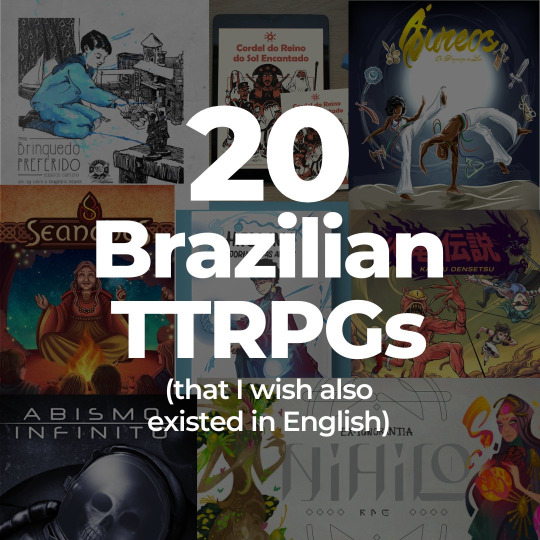
1. Meu Brinquedo Preferido ('My favorite toy'), by Eduardo Caetano
A metaphor about a child's growing process by deconstructing their fears through playful situations.

2. SeanchaS, by Jorge Valpaços and Jefferson Neves
A game about myths, construction of identity and narrative around bonfires, about the time of ancient stories and the present time.
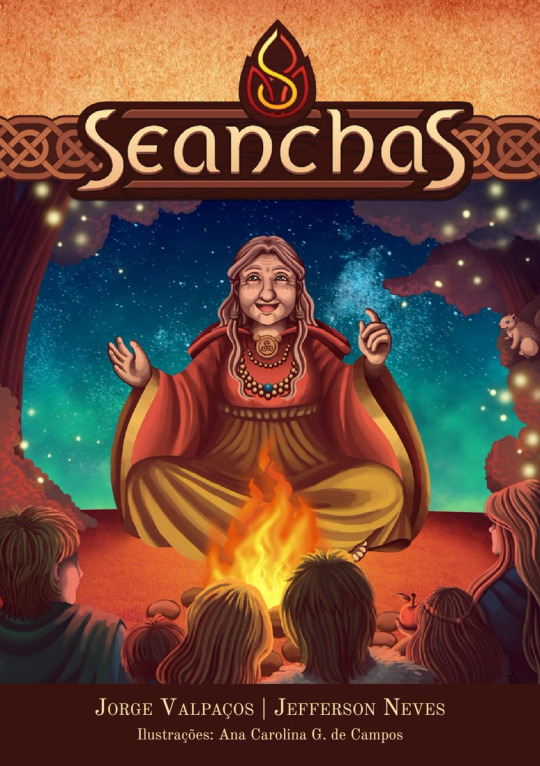
3. Gatunos, by Tiago Junges
A GMless/Solo game in which you play as cat thieves and mercenaries doing the dirty work of the five big factions that run the city.
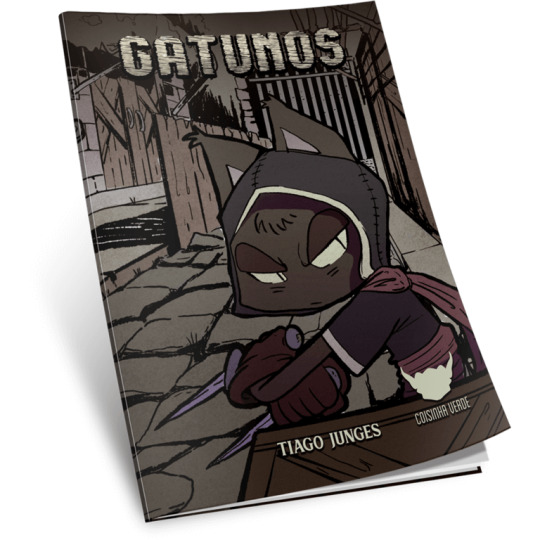
4. Nômades (Nomads), by Marcelo Collar
A card-based RPG in which you play as beings who have the ability to find and pass through the cracks in the veil that separates the universes.

5. Infaernum, by Caio Romero
Create your own apocalypse while playing the game, and interpret characters who experience the last days of all things.

6. Áureos, Os Dançarinos da Lua ('The Moon Dancers'), by Rey Ooze
A game of fight and freedom where dice play capoeira. You play as an 'Áureo', a former slave who, in a fantastic colonial Brazil, receives the blessings of his Orisha to free his people from slavery.

7. Veridiana, by Alan Silva
You play as creatures that live in a large tree, embarking on a deeply sentimental journey in search of a cure.

8. Karyu Densetsu, by Thiago Rosa and Nina Bichara
A game inspired by action anime and manga, with tactical combat, philosophical conversation, and passionate ideals.

9. Imperia, by Jonny Garcia
A game of politics and intrigue in a medieval court, inspired by Game of Thrones. Create a kingdom collaboratively and assume the role of the most influential people in it.
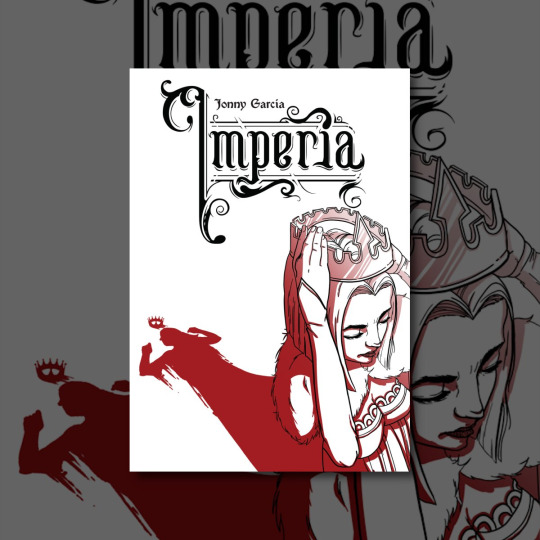
10. Goddess save the Queen, by Carol Neves and Julio Matos
A pulp adventure game in which you play as secret agents of the British Crown during the interwar period, with their own agenda connected in some way with their home nation.
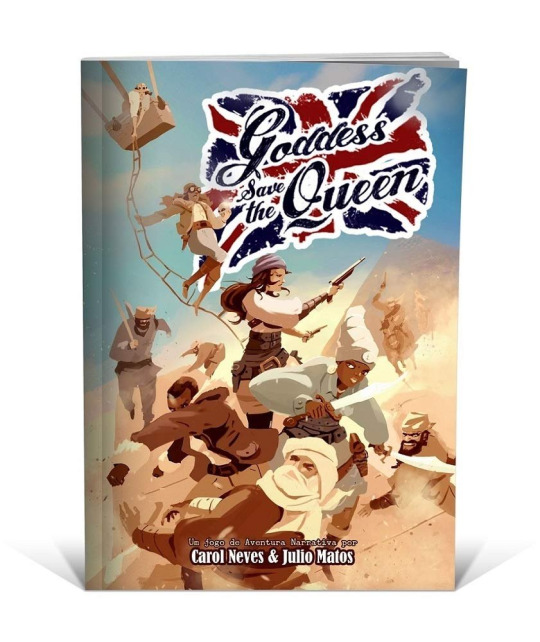
11. Abismo Infinito ('Infinite Abyss'), by John Bogéa
A narrative game of psychological horror in which the protagonists are astronauts, far away in space, involved in a web of lucid nightmares and manifestations of their own fears.

12. Mojubá, by Lucas Conti and Lucas Sampaio
An Afrofuturistic urban fantasy game inspired by Yoruba and Afro-Brazilian mythologies. Play as a person with fantastic powers who descends from the Orixás, fights evil spirits, and occasionally gets into a rap battle.
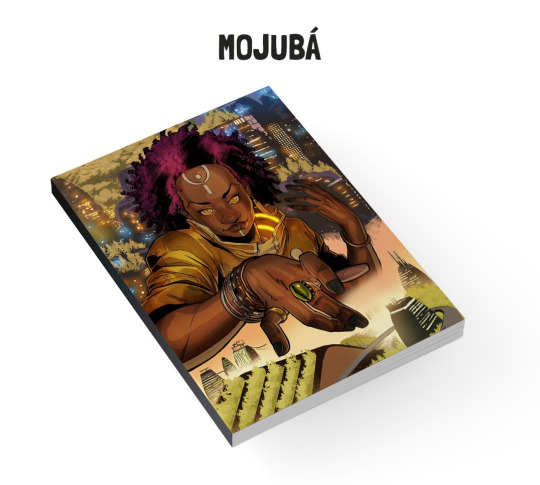
13. Chopstick, by Igor Moreno
A game inspired by action movies of oriental martial arts, gang fights and crime, with a twist on Fate Accelerated.

14. Contos do Galeão ('Tales of the Galleon'), by Encho Chagas
Create together the legend of a vessel that would have existed during the Golden Age of Piracy. Players will create the ship, its pirates, as well as its enemies, challenges, and rewards.

15. O Cordel do Reino do Sol Encantado ('The Cordel of the Kingdom of the Enchanted Sun'), by Pedro Borges
A narrative game set in the northeastern 'cangaço' region at the beginning of the 20th century.

16. Através das Trevas ('Through the Darkness'), by Ramon Mineiro
A post-apocalyptic fantasy game inspired by The Legend of Zelda: Breath of the Wild, The Witcher and Diablo.

17. Nihilo, by Andre Osna and Gustavo Rolanski
A world very much like our own—yet bigger, deeper, and stranger. Secret banks are run by Urban Dragons, Infernal mafias terrorize slums, interdimensional portals open in the basements of abandoned pizzerias.
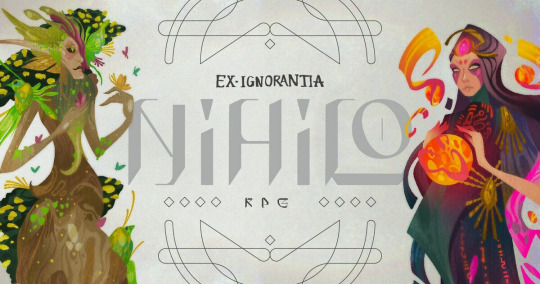
18. Caçada ao Colosso ('Hunt for the Colossus'), by Jairo Borges Filho
Reenact stories such as Siegfried and the dragon Fafnir, the Greek Odyssey or legends centered on the opposition of two primary forces of humanity.
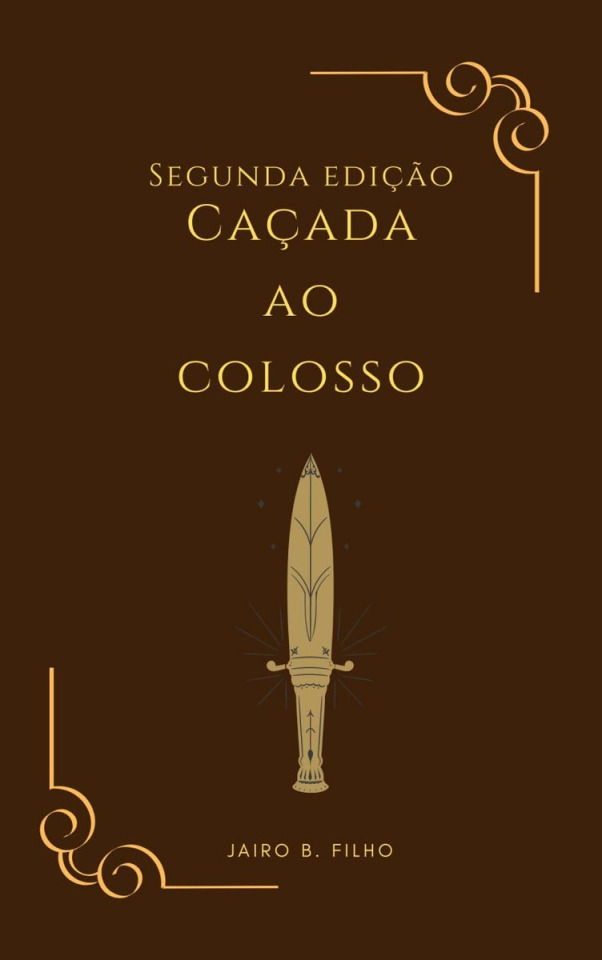
19. Perdidos ('Lost'), by Marcelo Paschoalin
Inspired by Bloodborne and Dark Souls, a world in ruins, fragmented to the point where only memories remain. You'll find relics of yesteryear, monstrous beasts, beings that have forgotten their purpose, and devious paths to tread.

20. Hitodama - A jornada das almas ('The Journey of the Souls'), by Alexsander Araujo
You are Shinigamis: creatures half divinity, half Yokai, who must carry out missions through different worlds, fighting formidable enemies and saving lost souls.

277 notes
·
View notes